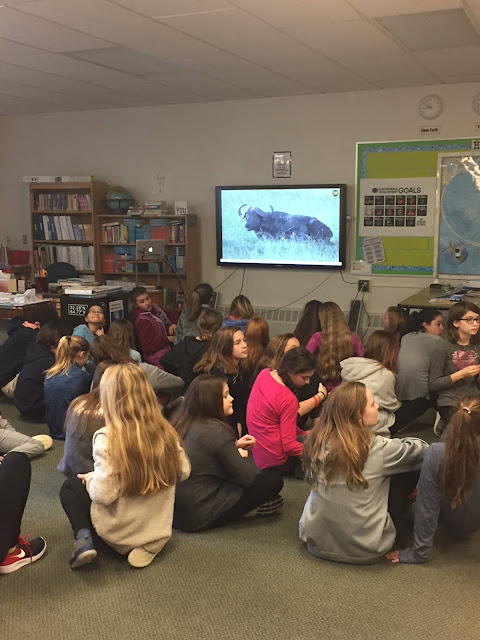Once students recognized that Africa is not a country, but rather a diverse continent, we were able to dive into the multiforms of the physical and human geography of sub-Saharan Africa. This week was filled with new discoveries and insights as we explored not only the physical geography, but cultural patterns, barriers to economic development, water scarcity, literary themes, visual arts, and the uniqueness of each of the individual countries that make up this distinct continent.
Specifically, students explored the unique cultures of countries within Africa through culture station rotation activities. Stations included exposure to the Swahili language (a Bantu language that is a trade and governmental language over much of East Africa and in the Congo region), a Google virtual reality expedition to Victoria Falls, tribal mask creations, literacy connection activities, and participating in Mancala and Nim tournaments. Through YouTube Live, we traveled virtually alongside a real-life safari in Kenya's Maasai Mara and South Africa's Kruger National Park. Students were able to ask the safari guides questions and receive answers in real time throughout the entire expedition. Mid-week, students prepared for and participated in Socratic seminars concerning barriers to economic development in Africa. Throughout their group discussions, it was evident that this format helped students build a deeper understanding of the ideas and values associated with this important global issue. And finally, just today, we were fortunate enough to host special guest, Mr. Fairbanks (Seb's dad, former U.S. Peace Corps teacher in Kenya, Fellow at the Weatherhead Center for International Affairs at Harvard University, Rwandan Presidential Advisor, author, entrepreneur, and director of the Akilah Institute for Women - the first women's college in Rwanda), who engaged us in stories about Africa's cultural diversity and presented students with a variety of artifacts to explore, representing important aspects of the cultures throughout Africa. Asante, Mhesimiwa Fairbanks. You had our full attention and interest for those precious forty-five minutes!
Stay tuned following the winter break for information regarding our upcoming project-based learning unit in which students will be challenged to design a transcontinental highway across Africa.
 |
| Cultural explorations through station rotations |
 |
| Live safari excursion in Kenya's Maasai Mara |












